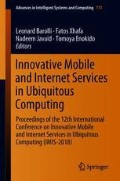Abstract
This paper mainly introduces the creative design of a children’s cognitive system based on RFID. The electronic tag is affixed to the real learning object, and the card reader is carried by the children. The main functions to be realized are vivid images, which give children quick and vivid knowledge of objects. Through the education of physical objects that can be touched, they can be vividly visualized, and children can be made to know objects vividly. In addition, based on our design concept, which connects cognition with material objects, it can actively mobilize children’s various sensory systems, so that children can have a deeper understanding of the learning objects and reduce the cost of education.
Access this chapter
Tax calculation will be finalised at checkout
Purchases are for personal use only
References
Xu, H., Ding, Y., Li, P., Wang, R., Li, Y.: An RFID indoor positioning algorithm based on bayesian probability and k-nearest neighbor. Sensors 17(1806), 1–17 (2017)
Xu, H., Ding, J., Li, P., Zhu, F., Wang, R.: A Lightweight RFID mutual authentication protocol based on physical unclonable function. Sensors 18, 760 (2018)
Tan, P., Wu, H., Li, P., Xu, H.: Teaching management system with applications of RFID and IoT Technology. Educ. Sci. 8, 26 (2018)
Liu, C., Fan, K., Pan, Y., et al.: Design of and research on an attendance system based on RFID and WSN technologies for the rail transportation industry. In: International Conference on Electrical and Information Technologies for Rail Transportation, pp. 1013–1024. Springer, Singapore (2017)
Zaman, H.U., Hossain, J.S., Anika, T.T., et al.: RFID based attendance system. In: Proceedings of 2017 8th International Conference on Computing, Communication and Networking Technologies (ICCCNT), pp. 1–5. IEEE (2017)
Acknowledgments
This work is financially supported by the National Natural Science Foundation of P. R. China (No.: 61672296, No.: 61602261), Scientific & Technological Support Project of Jiangsu Province (No.: BE2015702, BE2016185, No.: BE2016777), China Postdoctoral Science Foundation (No.: 2014M561696), Jiangsu Planned Projects for Postdoctoral Research Funds (No.: 1401005B), Postgraduate Research and Practice Innovation Program of Jiangsu Province (No.: KYCX17_0798), and NUPT STITP (No.: SYB2017019).
Author information
Authors and Affiliations
Corresponding author
Editor information
Editors and Affiliations
Rights and permissions
Copyright information
© 2019 Springer International Publishing AG, part of Springer Nature
About this paper
Cite this paper
Gan, H., Wu, C., Xu, J., Li, P., Xu, H. (2019). Design and Implementation of Cognitive System of Children’s Education Based on RFID. In: Barolli, L., Xhafa, F., Javaid, N., Enokido, T. (eds) Innovative Mobile and Internet Services in Ubiquitous Computing. IMIS 2018. Advances in Intelligent Systems and Computing, vol 773. Springer, Cham. https://doi.org/10.1007/978-3-319-93554-6_43
Download citation
DOI: https://doi.org/10.1007/978-3-319-93554-6_43
Published:
Publisher Name: Springer, Cham
Print ISBN: 978-3-319-93553-9
Online ISBN: 978-3-319-93554-6
eBook Packages: Intelligent Technologies and RoboticsIntelligent Technologies and Robotics (R0)

